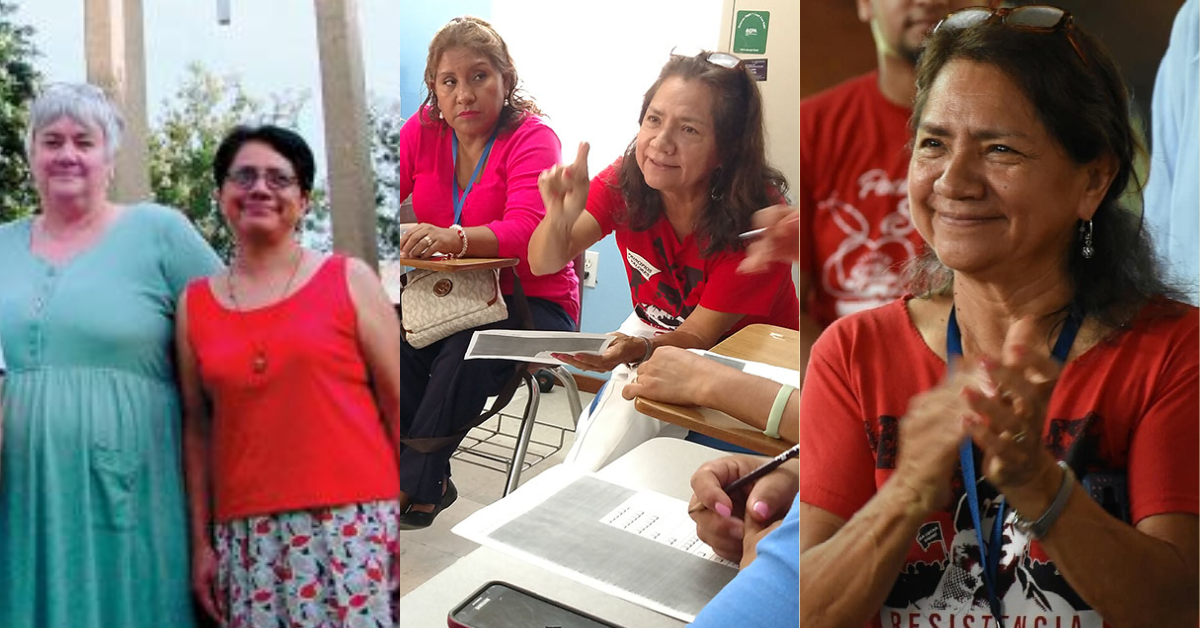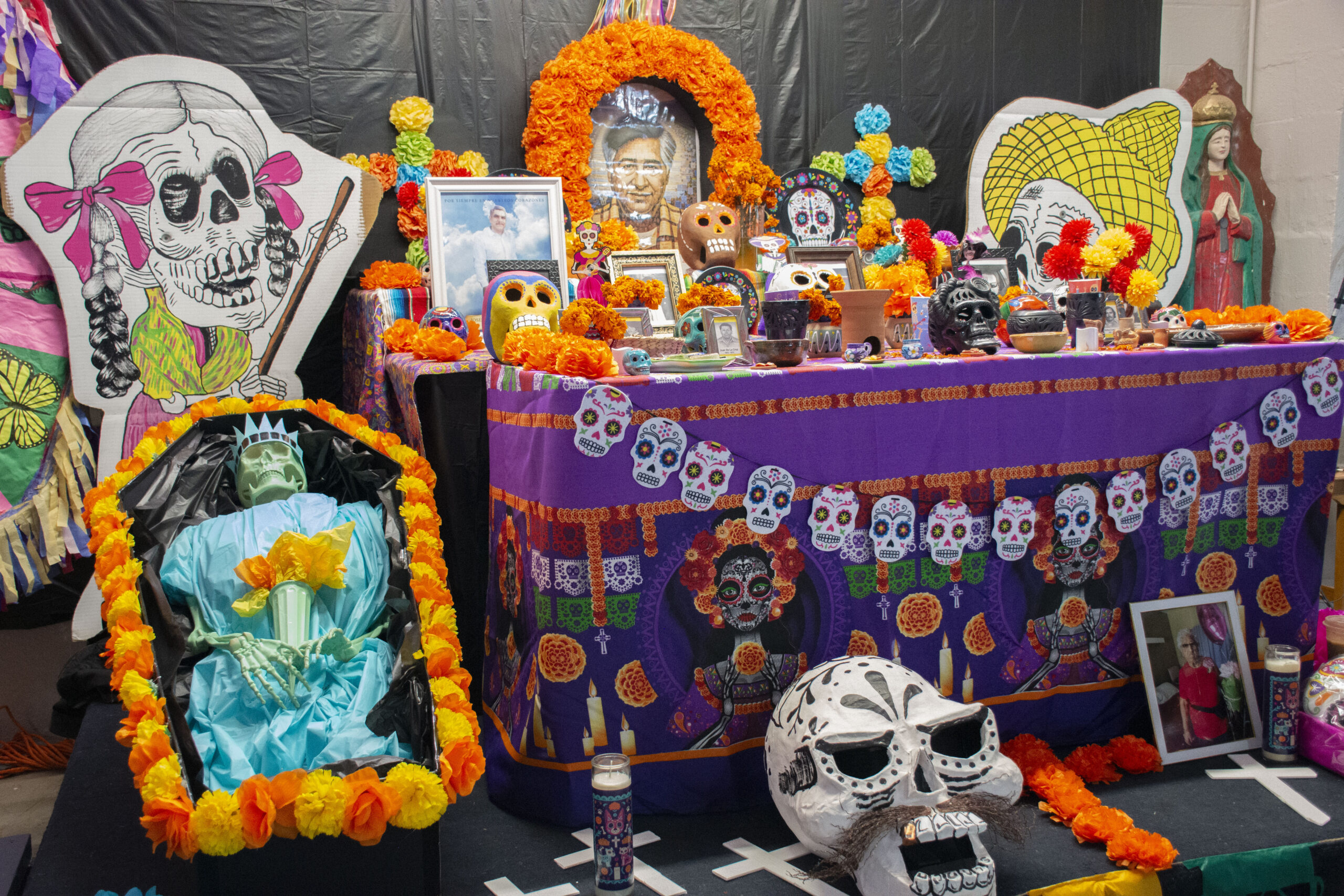Looking back on decades of commitment to social justice
 Martha Sanchez is retiring after 14 years leading LUPE’s community organizing work, almost 20 years in the farmworker movement and many decades of dedication to social justice.
Martha Sanchez is retiring after 14 years leading LUPE’s community organizing work, almost 20 years in the farmworker movement and many decades of dedication to social justice.
This small-statured, four-foot-ten, formerly undocumented, immigrant woman from Mexico is a giant in the social justice movement of the Rio Grande Valley. Martha has led LUPE members through pueblo-powered organizing victories like colonia streetlights, rural flooding protections, and higher standards for rural neighborhood developments. Her commitment to realizing the transformative teachings of Jesus has called her to a life of social justice.
There is no way that a web post could capture all that Martha has contributed to the movement in the Rio Grande Valley over her decades of commitment to social justice. That won’t stop us from looking back on and celebrating Martha’s journey.
Early Years
“All month I worked and I didn’t even have enough for the pair of shoes I had worn out that month.”
Raised in rural San Luis Potosí by her grandmother, Martha couldn’t afford a formal education past 6th grade. During her school years, she liked running and was good at it. But she could not afford running shoes. So she had to drop out of Physical Education.
When she was orphaned, she had to fend for herself. One of her last memories of Mexico was receiving her monthly wages and going to buy a pair of shoes. “All month I worked and I didn’t even have enough for the pair of shoes I had worn out that month,” she recalls. That’s when she decided to come to the U.S.
1969
Martha comes to the U.S. at the age of 15. She crosses without papers in Brownsville during the annual Charro Days celebration. She found work by asking shop owners near the international bridge if they needed someone to do housework.
Life in the U.S.
Martha meets her future husband, Manuel, through the family she worked for as a housekeeper. Martha and Manuel marry and have three children, Mark, Marty, and Micheal. Martha learns English by reading children's books to them. She eventually returns to school and obtains her GED.
1981
Martha and her family join the congregation of Holy Spirit Church in McAllen. Martha is involved in Valley Interfaith at its founding in the early 1980s.
“I think that that was a big turnaround in my own life. I wanted to do something more than be an average person — I wanted to be an activist.”
1988
Holy Spirit Church creates the Peace and Justice Commission. Through it, the congregation engages in immersion and encounter programs with communities in El Salvador during US-funded civil wars in Central America. Martha travels to El Salvador and witnesses how US military aid is used to kill innocent people.
“I came back from there realizing that I needed to be connected to progressive people who are part of movements,” she recalls. “We can’t do it ourselves by ourselves. We can’t do the change we want in this country by ourselves. We needed to be connected to a bigger thing. And that’s when we started connecting to the movement here.”
“I think that that was a big turnaround in my own life,” she says. “I wanted to do something more than be an average person — I wanted to be an activist.”
1990
Begins working at Holy Spirit Catholic Church in McAllen, becoming coordinator of family ministry and director of religious education. During her tenure, she advises congregants on how to find God in present society. Through the church’s Peace and Justice Commission, Martha helps congregants connect with and learn from farmworkers, immigrants, and colonia residents. “In the United Farm Workers we could see the God that is struggling to get the people out of misery,” she says.

From left: Holy Spirit parish staff Rosario Vaello, Ann Cass and Martha Sanchez — National Catholic Reporter photos/Teresa Malcolm
2000
Diocese of Brownsville abolishes 20-year-old pension plan for lay workers, prompting workers of five parishes to organize, including Holy Spirit (source). They turn to the United Farm Workers for help.

2002 | Joining the Farmworker Movement
Martha officially joins the United Farm Workers when she and her fellow parishioners at Holy Spirit sign a UFW union contract. Martha serves as union steward.

Holy Spirit parishioners and supporters from other parishes hold signs of protest between services in Holy Spirit Church's courtyard June 29.
As part of Caminando Por La Paz, Martha raises solidarity aid for El Salvador youth marginalized by US foreign military and economic policy (source).

Fr. Thomas Goekler with one of the first groups of kids of El Salvador that received Caminando Por La Paz scholarships with the help of Martha and the Peace & Justice committee of Holy Spirit Church.
2003
With Holy Spirit Church’s Peace and Justice Commission, Martha participates in anti-war and militarism protests against the Iraq war and the School of the Americas.

Martha along with Holy Spirit Peace and Justice Community and Call to Action members at School of the Americas protest in Ft Benning, GA, 2006. Left to right: Caroline Hallman, Martha Sanchez, Ana Lucia Hallman, Manuel Sanchez, and Sister Moira. Second row: Benny Arfele (center) and David Saavedra (right). Photo courtesy of Guy Hallman.
Fired from Holy Spirit for organizing. Unionized parish workers reach a settlement with the diocese later the same year and Martha comes back to work for the parish (source).
Watch: How Did You Learn to Organize?
Read more about the unionization effort in National Catholic Reporter's “Turmoil In Texas”
United Farm Workers transitions to La Unión del Pueblo Entero (LUPE) in South Texas.
2004
At mass meeting with state legislators at Union headquarters, LUPE launches campaign to win streetlights in colonias.

2006 | Martha's LUPE Years
Peace and Justice commission ousted from Holy Spirit Catholic Church. They continue their activities embodying Christ’s social justice teachings in private homes, like the earliest Christians once did (source).
Martha resigns from Holy Spirit along with two other union leaders, Ann Cass and Chayo Vaello, after three years of anti-union retaliation by Bishop Raymon Peña. In their resignation letter, they write, “Our struggle has never been about winning or losing. Our struggle has been about being faithful to the Gospel, about speaking truth to power and about working for justice for all people who are employed by the Catholic Church” (source).

Peace and Justice Committee members pictured in The Paper of South Texas, April 2006
Martha continues her commitment to social justice at LUPE, first as an organizer and later as the coordinator of community organizing. Switching careers after 25 years with the Church was a major challenge. “In the first year it was so difficult that I thought I wasn’t gonna make it,” she recalls. “But one thing I learned is that you can learn, at any age you can learn, right? You have the ability in our brain to really learn, and do things every day no matter what your age is.”
But when she found LUPE, she found a home.
“LUPE is important to me because it is an empowering organization who works with communities, lead by communities, by their own membership,” Martha recalls. “Because we have a base of 7,000 members, it is a strong organization that is creating the changes that people needs in their communities. And I think that we are a nonprofit organization with a great history of being created by Cesar Chavez. And that’s why it’s important to me, because I am a great fan of Cesar Chavez. And I think that his spirit continues with this organization. And that’s why it’s so important to me. I feel that this is where home is.”
“People in the colonias are my best teachers, they are the ones that taught me how to be a better organizer in a way that I have to really learn from them… To me, the people that I organize become my teachers.”
2007
With the help of former State Representative Veronica Gonzales, LUPE members win legislation that authorizes counties to collect a fee from residents to pay for the electricity used by streetlights (source).
“I thought I knew what people living in colonias needed but Martha opened my eyes.” – Former State Representative Veronica Gonzales
About Martha’s role in securing her commitment to streetlights, Rep. Gonzales says, “I thought I knew what people living in colonias needed but Martha opened my eyes. In a thoughtful and persuasive way, she educated me on how the need is more than just water and sewer and issues with flooding which we often hear about. She was instrumental in teaching me about the need for street lighting and the need for assuring that developers do not take advantage of homeowners who have paid for years on their property only to have it taken away because of documents that are one-sided and most often, only in English. She's a tremendous advocate.”

Dividing the county budget into the form of a pie, colonia residents strategize how to get a bigger piece of the pie devoted to public lighting.
2011
Martha leads a series of popular education-based leadership development trainings for colonia residents organizing to win streetlights. About the trainings she says, “Sometimes information gives them the confidence. Knowledge by itself is not power. But knowledge with the ability to organize together–it creates power. They feel powerful once they learn how the budget works. And when they articulate that, they feel they have power. And that gives them the ability to be able to stand in front of people and speak.”

Residents of colonia Linda Vista pose after asking County Commissioners for public lighting.
2012
The installation of solar-powered streetlights in thirteen Hidalgo County colonias marks the first time county officials recognize they have the ability and responsibility to light up county colonias (source).
Read: Public lights in the colonias? With LUPE, it can be done!
LUPE, along with partners in the RGV Equal Voice Network, pushes Hidalgo County to include colonias in the county’s $184 million-dollar drainage bond referendum. Thanks to the advocacy of colonia residents, the referendum includes $15 million for rural drainage projects and $10 million for regional drainage projects alleviating flooding in colonias.
2013
LUPE partners with ARISE, Texas Housers, and other colonia-serving organizations to launch the Land Use Colonia Housing Action (LUCHA) leadership development program. The initiative works with colonia leaders to become experts on county and state public policy impacting their neighborhoods. Leaders of LUPE and ARISE quickly become more knowledgeable on colonia neighborhood policy than many officials at the county level, including county commissioners.
2015
Colonia residents again bring the issue of streetlights to the Texas Legislature. With the help of Senator Chuy Hinojosa and State Rep Armando Martinez, colonia residents win the passage of HB 3002, a bill that gives counties additional tools and authority to install streetlights in rural neighborhoods (source).
“Knowledge by itself is not power. But knowledge with the ability to organize together–it creates power.”
With Martha’s guidance, colonia leaders design a streetlights program for Hidalgo County. LUPE and ARISE pressure Hidalgo County to adopt it. County commission votes unanimously to adopt the new program (source).
2016
County installs first round of streetlights under the new streetlights program won by LUPE and ARISE members (source).
Read: Texas Housers: Street light installation finally begins as colonia residents celebrate victory

Residents of Colonia Goolie Meadows enjoy the illumination provided by their new streetlights.
2018
After three years of efforts by colonia residents, the county votes to adopt new rules that improve quality of life in new colonias. The rules mandate streetlights and strong flooding protections for all new neighborhoods developed outside of city limits (source).
2019
Colonia residents organized with LUPE and ARISE win Spanish translation and interpretation at Hidalgo County public meetings (source).

With banners and signs, LUPE members celebrate translation victory outside of Hidalgo County Commissioners Court.
2020
Martha retires from LUPE, completing 14 years with the organization and 18 years as part of the farmworker movement.
On her final day, she reflects: “We are only on this journey leaving our footprints. And we have to believe that the seeds we plant will bear fruit. If you remember anything about what I’ve shared with you, it’s that if a little orphan from a town in Mexico that everyone said was worthless can touch so many lives, all of you can touch the lives of many people. ¡Si se puede!”
“[I]f a little orphan from a town in Mexico that everyone said was worthless can touch so many lives, all of you can touch the lives of many people.”
Martha, thank you for what we learned from you and for your contributions to the movement for social change. Your love for LUPE, our members, and the communities we serve is as steadfast as your commitment to social justice. You will always have a home with LUPE and the farmworker movement. As you say, “This is not a goodbye, but rather, hasta pronto.” We will see you again as soon as it is safe to gather in person. ¡Nos vemos en las próximas manifestaciones!
For now, enjoy your free time with your family and grandchildren. We are excited to see where the next 20 years in your movement journey will take you.
Sincerely,
Juanita, Esther, Tania, Vanessa, Daniel, Maricela, Jorge, John-Michael and the entire LUPE family


 Martha Sanchez is retiring after 14 years leading LUPE’s community organizing work, almost 20 years in the farmworker movement and many decades of dedication to social justice.
Martha Sanchez is retiring after 14 years leading LUPE’s community organizing work, almost 20 years in the farmworker movement and many decades of dedication to social justice.




